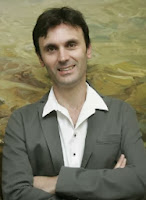It has been a pleasure for us to interview last week Prof. Jorge Mira Pérez, Full Professor at University of Santiago de Compostela (A Coruña, Spain).
European PhD degree, University of Santiago de Compostela, 1995, Dr. Mira Perez started The "ConCiencia" Programm in 1999 with which he has managed to bring to Galicia (Spain) 29 Nobel laureates and celebrities like Stephen Hawking. Between 2009-2011 he was recognized with the award of the Spanish Association of Physicists and Galicia Critics Award together with another 11 awards. Since 2006 he is Head of the Department of Applied Physics at University of Santiago de Compostela and became full Professor on Electromagnetics in 2011.
ARJ: Could you please do a brief introduction of your research?
In research I am developing 5 different lines: dielectric materials, dynamics of languages in competition in the same geographical area (simulation with differential equations), youth arthritis effects on the temporomandibular joint (includes acquisition and processing of inflammation’s images), visualization of the theory of relativity (with didactic reasons, mostly) and development of sensors of domestic electricity.
In disclosure, I am in charge of three lines: ConCiencia Program - www.usc.es/conciencia (visits of Nobel Prizes to Galicia), the Nerd Nites - nerdnite.com (scientific microspeech in places of entertainment at night) and collection of scientific divulgation of publishing at the University of Santiago de Compostela. I am also a scientific collaborator and columnist of the newspaper La Voz de Galicia and co-host of the regional television program of Galicia "Verbas van".
Finally, I am the director of the department of Applied Physics at the University of Santiago. However, scientific activity involved in that position is less because, although in theory there is a part of scientific activity management, in practice research groups have total independence.
ARJ: Did you find any difficulty or troubles to be who you are (academically) right now?
Every path has its difficulties. For me, the key was having to do military service - social service substitutionary - it cut my career short by a full year. It is also true that I have observed that "being in the right place at the right time" is quite true.
ARJ: Which are the factors that you understand most important for success in research?
The most important factor is to have time to reflect and think. It may seem stupid to say this, as it's quite obvious, but surprisingly there are many people (among whom I include myself) that sometimes lack of moments of peace to do it.
Of course, your research group and people in whom you can delegate to are key.
And finally, for me finding synergies has always worked: If anyone knows how to solve one aspect of our research that is taking a long time for us, I look for collaboration.
ARJ: Do you consider you spent your time in the best way? In other words, do you have a global time management plan?
No, I have not spent it in the best way. I've made mistakes and I have many things to correct. I say this because I try to stick to something that can be classified as my time management global plan and I realize how sometimes I turn away from what I consider the best path. I have attended courses and read a lot about time management, a topic that has always interested me.
ARJ: How do you normally plan your work? Do you set any list of daily task or goals to achieve?
Planning starts by separating the wheat from the chaff. Important issues have their own separate list. I have a list of short, medium and long term tasks. Of course, unexpected and date marked tasks (due to deadlines) can change my priorities.
ARJ: How do you set priorities in your work?
Depending on the importance of the line or the particular aspect considered (I know hierarchy perfectly). In addition, having a deadline also helps.
ARJ: Have you felt exceeded at some point by a high workload?
Yes I have, but I guess that it is reasonable because I admit that my schedule is contains a huge load of activities.
ARJ: Do you know about any time management technique specially useful for research?
In my mind I have principles that I consider essential, which are the identifications of the "time eaters", a sequence of steps of a project and reserve "thinking time" to which I referred above.
Anyway, I try not to forget that research is a creative activity, and needs its small portion of chaos. You must be willing to break the work plan if one day you find a vein: in some cases results appear suddenly and, when you get a good streak and the wind blows in your favor, you should stop everything else and focus on the specific streak. The other issues will have their turn.
ARJ: Do you think you could increase your scientific productivity through a good time management?
Yes I do, but it doesn’t happen, because in a heterogeneous work scheme, compartmentalizing often may not be appropriate.
ARJ: Have you ever applied them in your day-to-day?
Yes, I've always applied them. I have always had my own time management plan. In fact, one might say that my list of activities has been growing like a tree, based on the nature of the plan.
Interview made by Dr. Belén Suarez and Dr. David Alcantara for The All Results Journals
Original interview (in Spanish)


No comments:
Post a Comment